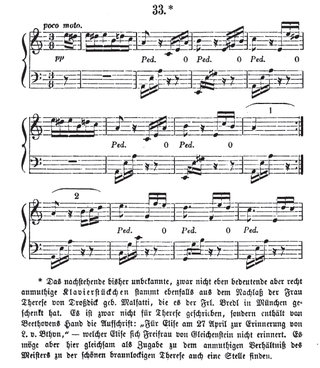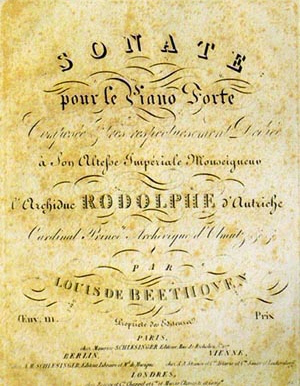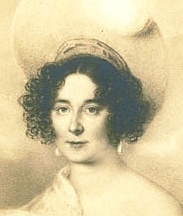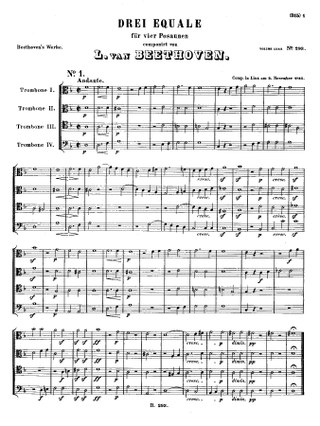Related Research Articles

Ludwig van Beethoven was a German composer and pianist. He is one of the most revered figures in the history of Western music; his works rank among the most performed of the classical music repertoire and span the transition from the Classical period to the Romantic era in classical music. His early period, during which he forged his craft, is typically considered to have lasted until 1802. From 1802 to around 1812, his middle period showed an individual development from the styles of Joseph Haydn and Wolfgang Amadeus Mozart, and is sometimes characterized as heroic. During this time, Beethoven began to grow increasingly deaf. In his late period, from 1812 to 1827, he extended his innovations in musical form and expression.

Bagatelle No. 25 in A minor for solo piano, commonly known as "Für Elise", is one of Ludwig van Beethoven's most popular compositions. It was not published during his lifetime, only being discovered 40 years after his death, and may be termed either a Bagatelle or an Albumblatt. The identity of "Elise" is unknown; researchers have suggested Therese Malfatti, Elisabeth Röckel, or Elise Barensfeld.

Louis Spohr, baptized Ludewig Spohr, later often in the modern German form of the name Ludwig was a German composer, violinist and conductor.
Werke ohne Opuszahl (WoO), also Kinsky–Halm Catalogue, is a German musical catalogue prepared in 1955 by Georg Kinsky and Hans Halm, listing all of the compositions of Ludwig van Beethoven that were not originally published with an opus number, or survived only as fragments. The work was originally titled in German Das Werk Beethovens: Thematisch-bibliographisches Verzeichnis seiner sämtlichen vollendeten Kompositionen.

Ferdinand Ries was a German composer. Ries was a friend, pupil and secretary of Ludwig van Beethoven. He composed eight symphonies, a violin concerto, nine piano concertos, three operas, and numerous other works, including 26 string quartets. In 1838 he published a collection of reminiscences of his teacher Beethoven, co-written with Beethoven's friend, Franz Wegeler. Ries' symphonies, some chamber works—most of them with piano—his violin concerto and his piano concertos have been recorded, exhibiting a style which, given his connection to Beethoven, lies between the Classical and early Romantic styles.

Marie Christiane Eleonore Prochaska was a German female soldier who fought in the Prussian army against Napoleon during the War of the Sixth Coalition.

The Catalogues of Beethoven compositions are all of the different ways in which the musical compositions by Ludwig van Beethoven have been organized by researchers into his music.

Baroness Therese von Droßdik was an Austrian musician and a close friend of Ludwig van Beethoven. She is best known as one of the possible dedicatees of Beethoven's famous bagatelle, "Für Elise", WoO 59.
"Zärtliche Liebe", WoO 123, or "Ich liebe dich", is a love song by Ludwig van Beethoven that he composed in 1795 and first published in 1803. Beethoven was 25 years old when he wrote it. The song is occasionally referred to by its first line, "Ich liebe dich, so wie du mich".
Max Ernst Unger was a German musicologist. Although he wrote on a variety of subjects, he is chiefly known for his extensive research and writings on the life and works of Ludwig van Beethoven.
Friedrich August Kanne (1778–1833) was a composer and music critic in Vienna.

Johann Baptist Malfatti, Edler von Monteregio baptized as Giovanni Domenico Antonio Malfatti was an Italian/Austrian doctor famous for treating the composer Ludwig van Beethoven.

The Three Equals for four trombones, WoO 30, are three short equales for trombones by Ludwig van Beethoven.
Joseph Karl Bernard was an Austrian journalist and librettist, and friend of Ludwig van Beethoven.
Ludwig van Beethoven's "Es ist vollbracht", WoO 97, was written in 1815 as a finale chorus for a Singspiel by a variety of composers called Die Ehrenpforten on a drama by G. F. Treitschke. It honours the second seizure of Paris in 1815 after the abdication of Napoleon. It remains one of Beethoven's lesser-known works and is rarely produced nowadays.

Ludwig van Beethoven composed at least six works for mandolin, four of which survive. None were published during his lifetime. Though known better as a pianist, Beethoven possessed a Milanese mandolin, which was hung beside his piano. He was friends with two prominent mandolinists, both of whom were linked to his surviving mandolin music.
Sieghard Brandenburg was a German musicologist, who stood out especially as a Beethoven researcher.
References
- ↑ Work details, Beethoven-Haus (in German)
- 1 2 Beethoven, Ludwig von (c. 1864). "Schlussgesang: "Germania, wie stehst du jetzt"". Ludwig van Beethovens Werke, Serie 20: Dramatische Werke, Nr. 207d. Leipzig: Breitkopf und Härtel – via IMSLP.
- ↑ Schindler, Anton Felix. Beethoven As I Knew Him, p. 168.
- ↑ Marx, Adolf Bernhard. Ludwig van Beethoven. Leben und Schaffen. Zweiter Theil, Verlag Otto Janke. Berlin: 1863. p. 185.
- ↑ "Abschiedsgesang an Wiens Bürger" (audio) on YouTube